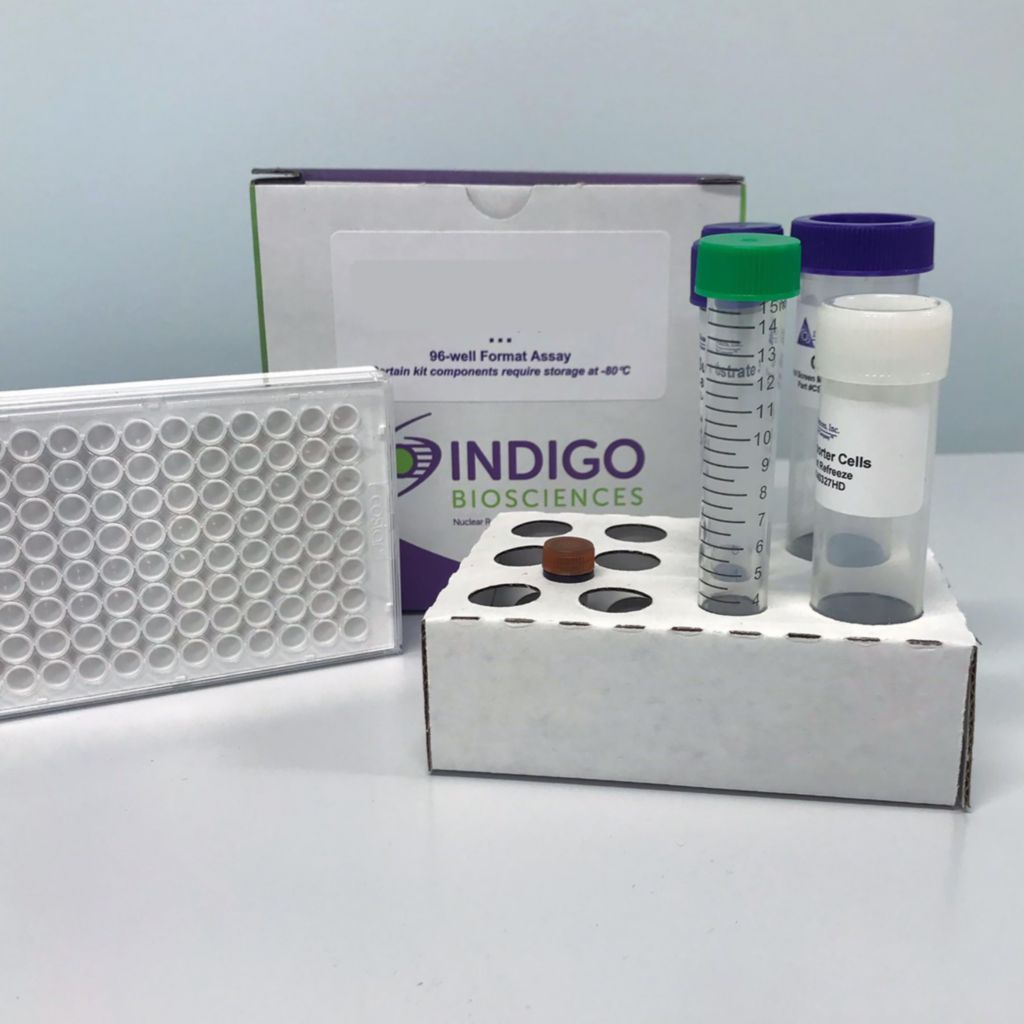Product Description and Product Data
This is an all-inclusive cell-based luciferase reporter assay kit targeting the Human TEAD4/YAP (Hippo Pathway). INDIGO’s TEAD4/YAP reporter assay utilizes proprietary mammalian cells that have been engineered to provide constitutive expression of TEAD4/YAP. In addition to TEAD4/YAP Reporter Cells, this kit provides two optimized media for use during cell culture and in diluting the user’s test samples, a reference agonist, Luciferase Detection Reagent, and a cell culture-ready assay plate. The principal application of this assay is in the screening of test samples to quantify any functional activity, either agonist or antagonist, that they may exert against human TEAD4/YAP. This kit provides researchers with clear, reproducible results, exceptional cell viability post-thaw, and consistent results lot to lot. Kits must be stored at -80C. Do not store in liquid nitrogen. Note: reporter cells cannot be refrozen or maintained in extended culture.
Features
Clear, Reproducible Results
- All-Inclusive Assay Systems
- Exceptional Cell Viability Post-Thaw
- Consistent Results Lot to Lot
Product Specifications
| Target Type | Transcription Factor | ||
| Species | Human | ||
| Receptor Form | Hybrid | ||
| Assay Mode | Inverse Agonist | ||
| Kit Components |
| ||
| Shelf Life | 6 months | ||
| Orthologs Available | No | ||
| Shipping Requirements | Dry Ice | ||
| Storage temperature | -80C |
Data
Target Background
The Hippo tumor suppressor pathway coordinates cellular signals that modulate cell proliferation, tissue homeostasis, and organ size. This signaling primarily regulates the ability of YAP, or its paralog TAZ, to bind and co-activate the TEAD family of transcription factors (TEAD1-4).
YAP confers traits that sustain cell proliferation, inhibit apoptosis, promote angiogenesis, and develop resistance to therapies. The TEAD/YAP complex is therefore considered an oncogene regulator, as the dysregulation of YAP is strongly associated with the onset and progression of several cancers, such as prostate and pancreatic cancer. As such, the Hippo pathway is a premier target for the development of novel, specific, small molecule inhibitors.
The evolutionarily conserved Hippo pathway comprises a complex activation cascade of protein kinases. Activated MST1/2 forms a complex with SAV1 to phosphorylate and activate LATS1/2 kinases. Activated LATS in complex with MOB1 phosphorylate YAP and/or TAZ, leading to cytoplasmic retention via association with 14-3-3d. Alternatively, phosphorylated YAP may be ubiquinated and targeted for proteasomal degradation. Under these conditions the expression of genes associated with pro-proliferative cell function is reduced. The inhibition, or dysregulation, of this kinase cascade leads to reduced phosphorylation of YAP, their translocation to the nucleus, and association with TEAD transcription factors. The assembly of an active TEAD/YAP (or TEAD/TAZ) transcription complex induces expression of oncogenic target genes involved in mediating cell proliferation, migration, and survival.
INDIGO’s Hippo pathway assay system utilizes proprietary human cells engineered to provide high-level expression of a hybrid form of the Human Transcriptional Enhanced Associate Domain 4 Protein (TEAD4), whereby the DNA binding domain (DBD) of the native TEAD4 has been substituted with that of the yeast Gal4-DBD. Additionally, these reporter cells express the requisite transcriptional co-activator Human Yes-Associated Protein 1 (YAP) as well as the luciferase reporter gene functionally linked to tandem Gal4 Upstream Activation Sequence (UAS) genetic response elements. The use of a hybrid Gal4(DBD)-TEAD4 is a well-used strategy, and ensures that any treatment-induced changes in reporter gene activity are the direct result of changes in Gal4(DBD)-TEAD4 / YAP transcriptional activity.
To reiterate, the reporter cells provided in INDIGO’s assay present the “Hippo Off,” or oncogenic pathway. Specifically, the Gal4(DBD)-TEAD4 transcription factor and the YAP co-activator are over-expressed to produce a constitutively active transcription complex that delivers high-level expression of the luciferase reporter gene. The primary application of this assay system is to screen test materials for inhibitory activities against the TEAD4 / YAP transcription complex.
Also available as a service
